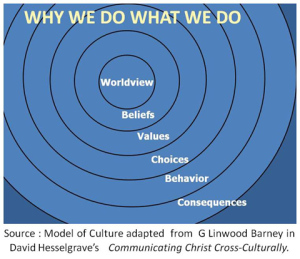
Introduction
Last time we discussed the most basic element of our thinking and reasoning, our presuppositions. Our presuppositions are the most basic beliefs we hold about ourselves, where we came from, what is right and wrong, and the world around us. They form and shape and color how we think and interpret everything.
From our presuppositions come the next layer of our thinking- our worldview.
Worldview
Our worldview is the way that we look at and evaluate the world in which we live. This evaluation includes what we see, feel, value and believe. Our worldview forms a system by which we understand the world.
As an example, we see a worldview expressed in the following presuppositional statements:
Sovereignty- God is sovereign. He possesses absolute authority over all things. He has created all things, sustains all things, and governs all things. He is the fountain of all being and truth. He works all things together for His own glory and purposes.
Antithesis- the principles by which believers live are squarely opposed to the principles by which unbelievers live. The Scriptures are clear that we are to bring “every thought into captivity to the obedience of Christ.” (2Cor. 10:5) Thus, to provide a God-centered and truly Christian education, it is necessary to break completely free from the educational philosophies that surround us. We must build from the ground up, with the Scriptures as the foundation, both our educational philosophies and the framework in which we understand and present all subject matter.
Neutrality – Because God is sovereign over all of His creation, there is no aspect of creation that does not reflect His glory and truth; hence, there is no place, subject, or issue that is neutral and that does not point to the Creator of all.
Application
So what? What does all this have to do with you and your walk with Christ every day? Let’s see if I can make it very relevant.
Remember Prov. 4:23 we read- “Keep thy heart with all diligence, for out of it flow the issues of life.”
We have already noted that this verse is speaking to our presuppositions and the importance of examining those presuppositions because they will impact how we see the world. But people rarely do this and so they live their lives blissfully inconsistent with those presuppositions. To illustrate what I mean and how what we have been talking about applies to our lives I would like to tell a story:
There were two men riding in a railway coach looking out the window at one of the stops. One of them points to a nearby hillside where they see numerous white stones scattered about in a pattern that looked like this: THE CANADIAN RAILWAY WELCOMES YOU TO CANADA.
The first man observes that it took a lot of work to arrange the stones in that pattern, but the other disagrees and says, “I see no proof that any work was expended on the arrangement of those stones. After all, similar stones are scattered about on other parts of the hill. These stones could have rolled down the slope periodically and may have simply rolled accidentally into this unique arrangement.”
The first man said, “Don’t you think you are being just a bit uncritical and irrational?”
The second man responded, “Show me the proof that someone did the work to arrange these stones in this way.” The first man has to admit that he has no actual proof (from where they are sitting) that anyone arranged the rocks this way. He went on to say, “I do feel that my own explanation that someone purposely arranged the rocks is easier to believe than your accidental or chance based theory, but my judgment is only based on probability and is somewhat subjective.”
A few minutes later, the second man who believes the rocks were arranged by accident suggests, “I think we should get out at the station and exchange our U. S. currency for Canadian money.”
“What makes you think we should do that?” asks the first man.
The second man answers, “Can’t you read?” while pointing to the rocks on the hill “It says we’re entering Canada!”

What is it that makes this story humorous? It is the fact that the second man is acting in a way that is inconsistent with his own presuppositions. By suggesting they change their money, he has demonstrated that he, too, believes the arrangement of the stones is no accident but they have, in fact, meaning. His conclusion that they are entering Canada, based on the arrangement of the stones, is inconsistent with his earlier claim that the stones had fallen into that pattern by accident. His actions and words demonstrate that he, too, believes someone placed the stones in this arrangement on purpose in order to communicate something.
While a humorous story, the sad truth is that the majority of men in our day live just as inconsistently as the man on the train. They look at the universe around them and say it all just happened by chance, yet they live their lives based on law and order, purpose and meaning. If we can learn to identify those areas of inconsistency, we can help such people to see the strong likelihood that a personal creator-God exists.
If we don’t spend time examining and evaluating our presuppositions in terms of Scripture we may find that we are guilty of making the same mistake as the man on the train. On the other hand, if we undertake this important task we will find that a whole new world opens up to us. In other words, by thinking Christianly, or we may say consistently based on the facts, we have opportunities to witness to a lost world.
Anytime we use our reasoning ability to draw conclusions, and any time we look at patterns in the universe to discover truth, such as scientific laws, we are affirming by our actions that we already suppose there is a rational or logical basis to the universe. Therefore, naturalists, materialists, or atheists who use reason are being just as inconsistent as the man on the train. By thinking and reasoning in a consistently Christian way, we can speak with authority to these men and perhaps share the Gospel with them.

Another example is in order here. Ever heard of the Big Bang? According to naturalists, everything in the universe is the result of chance and arose out of chaos, out of a big explosion that occurred billions of years ago that set our universe in motion. They see reality as a series of random causes and effects, that is to say, matter in collision with matter and energy, reacting according to natural law.
If this is true, then everything that exists has been chemically determined. How is this so? Naturalists believe that chemicals and energy don’t decide what to do when they collide. They do whatever the conditions and natural laws dictate. In other words, they believe that there is a cause and effect sequence in operation wherein each event has a given result. According to this naturalistic model, there can be nothing outside these chemical reactions, like the human mind, that is not also a part of this cause and effect chain. So the rational conclusion according to this naturalistic worldview is that what we think are free thoughts on our part are really just chemical reactions in the synapses of our brains, In other words, the love you say you feel for your spouse, or your parents is really nothing more than a chemical reaction in your brain. If we are simply part of this cause and effect chain, all our thoughts and perceptions must be preconditioned, or determined, by chemistry and physics.
Why, then, would anyone with this presuppositional base think his own thought processes could tell him anything about reality? Why would he think that what is nothing more then the product of these chemical reactions can have any meaning, or be true?
On the other hand, if we think our minds are not completely conditioned by just natural law, we must presuppose the possibility that something non-material exists and influences them. We must pre-suppose that the supernatural exists and that it influences the material world in which we live, and that it even influences our thinking.
The fact that we use our reason to interpret reality, and the fact that we trust these conclusions also shows that we believe that there is an orderly and rational basis to the universe. Such reasoning, and such confidence in reason is consistent with theism, a belief in an infinite personal God, like the God of the Bible, not with naturalism, which is the belief that nothing exists but matter and energy. As theists, we argue that this reasonable and orderly basis behind the universe is none other than the reasoning and personal One who created all, and is Himself the ground of all being.
When we act as though we are free choosing beings, rather than determined ones, we imply that we believe there is a basis for freedom. Again, belief in personal freedom is only consistent with theism, never with naturalism. As theists, we argue that this basis is the eternally free, and sovereignly choosing creator God who has made us in his image.
The same goes for morality. Morality is impossible without free choice. Suppose I use a gun to shoot someone dead. When the police come, who or what do they arrest? They arrest me, not the gun, even though the gun actually did the shooting. Why shouldn’t the gun have to serve a prison sentence along with me?
The answer is obvious. The gun is a machine, incapable of choice. It does whatever I make it do. It cannot act on its own initiative. Therefore, we ignore the gun from the standpoint of morality and go the first free choosing being involved in the crime. Only when we are free to choose can we be held responsible morally.
People who accept that there is such a thing as morality must also presuppose a personal basis for morals. But naturalists have no such basis in their worldview. Ask yourself, “Is it morally wrong to abuse 3 year olds?” How do you come to that conclusion? Is this purely a personal moral preference, or is there a universal moral standard at stake? If such a moral is universal, and lies outside of the individual’s decision to make it a moral, then there must be a basis.
Chemicals bumping into one another cannot teach us that child abuse is wrong, or that human life matters. Quite the contrary! If we are purely matter and energy, and are the result of random material processes, then we are destined one day to perish as a race in the destruction of the present solar system. If this is so, what difference does it make how that matter is configured in the meantime? Whether our molecules take one form (a living person) or another (a decomposed body) cannot be moral issue.
Neither can we explain why people are free under the naturalistic worldview. If people are nothing but matter, they must do what they do because they were conditioned to do so. What other reason would there be? But if we were conditioned to do what we do, we are no freer in our choices than the gun. At this point all morality disappears.
In one area after another, we will find that it is impossible to act in such a way that we are consistent with the worldview of naturalism. Therefore this world-view fails the test of internal consistency, and should be rejected by honest thinkers. Instead, we should accept the fact that a personal moral and rational God has indeed created our world and us.
When people realize their presuppositions don’t match their conclusions, they often become open to new information. We have the information they need! The universe is personal, moral, and free at it’s core because its creator is personal, moral, and free. Notice that the presuppositional argument does not point to the pantheistic deities of the east. Only a personal and infinite God can account for what we see in the world.
Eph. 4:17-19 reminds us- “This I say, therefore, and testify in the Lord, that you should no longer walk as the rest of the Gentiles walk, in the futility of their mind, having their understanding darkened, being alienated from the life of God, because of the ignorance that is in them, because of the blindness of their heart; who, being past feeling, have given themselves over to lewdness, to work all uncleanness with greediness.”
The Bible’s call to us is clear- we must be about the God-given task of renewing our minds, of developing the mind of Christ. We must win back the ground which the church has surrendered. This process begins with a careful examination of our presuppositions and our worldview. What is it we believe about God? About man? About why we are here? These are the questions we must ask about ourselves. Then we must trace through our thinking and how we live and begin to bring them into alignment with God’s Word, and we must live consistently in terms of those presuppositions.
In our next lesson we hope to further that process by painting a picture of our target- the Christian mind.


